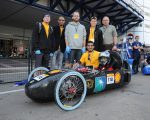ME Senior Design Team wins First Place at the Shell Eco-Marathon Americas
 HOUSTON – Determined to be the first team from the University of Colorado Denver to participate in and win the Shell Eco-Marathon Americas competition – which encourages students to design the most fuel-efficient vehicles in the world – nine members of the university’s Mechanical Engineering Senior Design class achieved their goal on April 7. The team won first place in their category for a hydrogen fuel cell vehicle they designed and built that achieved a maximum of 205 miles per gallon. (Last year’s winner in the same category achieved 169 miles per gallon.)
HOUSTON – Determined to be the first team from the University of Colorado Denver to participate in and win the Shell Eco-Marathon Americas competition – which encourages students to design the most fuel-efficient vehicles in the world – nine members of the university’s Mechanical Engineering Senior Design class achieved their goal on April 7. The team won first place in their category for a hydrogen fuel cell vehicle they designed and built that achieved a maximum of 205 miles per gallon. (Last year’s winner in the same category achieved 169 miles per gallon.)
“When we first got our car on the track, I had a good feeling,” said Aydh Alajmi, who served as the team’s project manager. “I never thought that six months ago, when we were doing fuel calculations back at school that I would be doing it here in real life. It’s unbelievable.”
The seventh-annual competition, held in Houston on April 5-7, drew 134 high school and college teams from North and South America, including the United States, Canada, Brazil, Mexico and Guatemala. Students competed in a Prototype category, which focused on futuristic vehicles that achieved extreme fuel efficiency, and in an Urban Design category, which focused on more practical vehicles that could conceivably be driven on roadways. All vehicles could use diesel, gasoline, ethanol, Fatty Acid Methyl Ester (FAME), hydrogen or battery electric for power. Alajmi’s team won in the prototype, hydrogen-fueled category.
The team secured funding from Saudi Aramco, which is sponsoring Alajmi’s education at the university, and built a 120-pound, three-wheeled vehicle from carbon fiber and a honeycomb core ribbing system that used hydrogen fuel cells for power. The vehicle, called the H2 Eco Challenger, also utilized a trapezoidal steering mechanism and a mountain bike hydraulic disc brake system to minimize friction and drag. To further their chances of winning, the team selected a 112-pound male driver – making the 10 required laps around a 0.6-mile track extra light.
“When Aramco approved sponsoring my team, it showed the support it provides for creativity, technology and new ideas,” Alajmi said.
The investment proved successful, as the team’s vehicle was tested on the streets of Houston. “The road was very rough. There were potholes and lots of vibrations, so that was a little scary,” said Surawud Martinez, the driver. Wearing a headset that allowed the team to communicate with him as he drove the circular course, Martinez said, “Each time I was whipping around, they were telling me what lap number I was on and how to make better turns and passes.”
The team’s advisor, Ron Rorrer, associate professor of mechanical engineering, said he attributes the success of the project to it being solely student driven, including the vehicle’s design, materials and even how the vehicle was shipped to the competition. “When they pick the things they want to do, that’s where you get the commitment. That’s where you get a student for a three-credit hour class putting in 1,000 hours over nine months,” he said.
Alajmi can attest to that, admitting he has been in the machine shop some nights until 2 or 3 a.m. trying to build the vehicle this spring semester. It was designed last semester by the same team. “This project has been my life. It’s been everything for me this past year. There are not even words to describe my feelings. We’ve been working even for 12 hours and sometimes 15 hours a day.”
While this year’s winners basked in their successes, many teams had to cope with disappointment, as the competition was not without its hiccups. Many vehicles were towed from the course for various mechanical failures, and some teams were disqualified for not following the required technical and safety requirements, including wearing safety glasses as they made last-minute adjustments inside designated construction areas at the city’s George R. Brown Convention Center.
But the purpose of the competition is to learn lessons and experience the trial and error process of mechanical design, Rorrer said.
The team members included Alajmi, Martinez, Ryan Anderson, Ibrahim Alzamanan, David Edelman, John Van Ngo, Dong Nguyen, Ronnie Prado and Nick Wager. Their website, which describes the design of the vehicle and includes photos and video of its performance, is http://h2ecomarathon.wordpress.com.
By Heather Saucier, Aramco Services Company
CU Denver Engineering, Design and Computing View All
At the CU Denver College of Engineering, Design and Computing, we focus on providing our students with a comprehensive engineering education at the undergraduate, graduate and professional level. Faculty conduct research that spans our five disciplines of civil, electrical and mechanical engineering, bioengineering, and computer science and engineering. The college collaborates with industry from around the state; our laboratories and research opportunities give students the hands-on experience they need to excel in the professional world.


One thought on “ME Senior Design Team wins First Place at the Shell Eco-Marathon Americas” Leave a comment ›